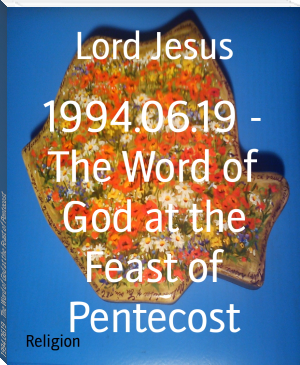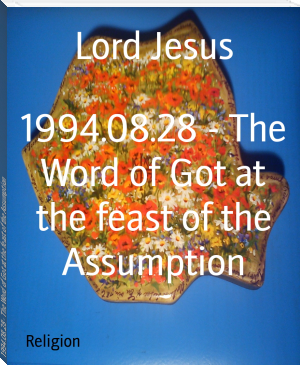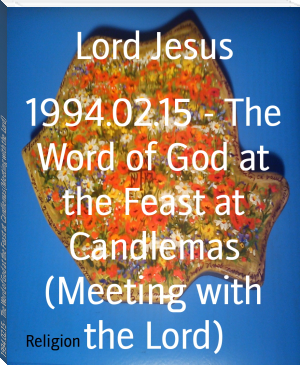Orthodoxy by G. K. Chesterton (list of e readers txt) 📖

- Author: G. K. Chesterton
- Performer: -
Book online «Orthodoxy by G. K. Chesterton (list of e readers txt) 📖». Author G. K. Chesterton
He spoke about men and their ideals exactly as the most insolent Unionist talks about the Irish and their ideals. He turned mankind into a small nationality. And his evil influence can be seen even in the most spirited and honourable of later scientific authors; notably in the early romances of Mr. H.G.Wells. Many moralists have in an exaggerated way represented the earth as wicked.
But Mr. Wells and his school made the heavens wicked.
We should lift up our eyes to the stars from whence would come our ruin.
But the expansion of which I speak was much more evil than all this.
I have remarked that the materialist, like the madman, is in prison; in the prison of one thought. These people seemed to think it singularly inspiring to keep on saying that the prison was very large.
The size of this scientific universe gave one no novelty, no relief.
The cosmos went on for ever, but not in its wildest constellation could there be anything really interesting; anything, for instance, such as forgiveness or free will. The grandeur or infinity of the secret of its cosmos added nothing to it. It was like telling a prisoner in Reading gaol that he would be glad to hear that the gaol now covered half the county. The warder would have nothing to show the man except more and more long corridors of stone lit by ghastly lights and empty of all that is human.
So these expanders of the universe had nothing to show us except more and more infinite corridors of space lit by ghastly suns and empty of all that is divine.
In fairyland there had been a real law; a law that could be broken, for the definition of a law is something that can be broken.
But the machinery of this cosmic prison was something that could not be broken; for we ourselves were only a part of its machinery.
We were either unable to do things or we were destined to do them.
The idea of the mystical condition quite disappeared; one can neither have the firmness of keeping laws nor the fun of breaking them.
The largeness of this universe had nothing of that freshness and airy outbreak which we have praised in the universe of the poet.
This modern universe is literally an empire; that is, it was vast, but it is not free. One went into larger and larger windowless rooms, rooms big with Babylonian perspective; but one never found the smallest window or a whisper of outer air.
Their infernal parallels seemed to expand with distance; but for me all good things come to a point, swords for instance.
So finding the boast of the big cosmos so unsatisfactory to my emotions I began to argue about it a little; and I soon found that the whole attitude was even shallower than could have been expected.
According to these people the cosmos was one thing since it had one unbroken rule. Only (they would say) while it is one thing, it is also the only thing there is. Why, then, should one worry particularly to call it large? There is nothing to compare it with.
It would be just as sensible to call it small. A man may say, “I like this vast cosmos, with its throng of stars and its crowd of varied creatures.” But if it comes to that why should not a man say, “I like this cosy little cosmos, with its decent number of stars and as neat a provision of live stock as I wish to see”?
One is as good as the other; they are both mere sentiments.
It is mere sentiment to rejoice that the sun is larger than the earth; it is quite as sane a sentiment to rejoice that the sun is no larger than it is. A man chooses to have an emotion about the largeness of the world; why should he not choose to have an emotion about its smallness?
It happened that I had that emotion. When one is fond of anything one addresses it by diminutives, even if it is an elephant or a life-guardsman. The reason is, that anything, however huge, that can be conceived of as complete, can be conceived of as small.
If military moustaches did not suggest a sword or tusks a tail, then the object would be vast because it would be immeasurable. But the moment you can imagine a guardsman you can imagine a small guardsman.
The moment you really see an elephant you can call it “Tiny.”
If you can make a statue of a thing you can make a statuette of it.
These people professed that the universe was one coherent thing; but they were not fond of the universe. But I was frightfully fond of the universe and wanted to address it by a diminutive. I often did so; and it never seemed to mind. Actually and in truth I did feel that these dim dogmas of vitality were better expressed by calling the world small than by calling it large. For about infinity there was a sort of carelessness which was the reverse of the fierce and pious care which I felt touching the pricelessness and the peril of life.
They showed only a dreary waste; but I felt a sort of sacred thrift.
For economy is far more romantic than extravagance. To them stars were an unending income of halfpence; but I felt about the golden sun and the silver moon as a schoolboy feels if he has one sovereign and one shilling.
These subconscious convictions are best hit off by the colour and tone of certain tales. Thus I have said that stories of magic alone can express my sense that life is not only a pleasure but a kind of eccentric privilege. I may express this other feeling of cosmic cosiness by allusion to another book always read in boyhood, “Robinson Crusoe,” which I read about this time, and which owes its eternal vivacity to the fact that it celebrates the poetry of limits, nay, even the wild romance of prudence. Crusoe is a man on a small rock with a few comforts just snatched from the sea: the best thing in the book is simply the list of things saved from the wreck. The greatest of poems is an inventory. Every kitchen tool becomes ideal because Crusoe might have dropped it in the sea.
It is a good exercise, in empty or ugly hours of the day, to look at anything, the coal-scuttle or the bookcase, and think how happy one could be to have brought it out of the sinking ship on to the solitary island. But it is a better exercise still to remember how all things have had this hair-breadth escape: everything has been saved from a wreck. Every man has had one horrible adventure: as a hidden untimely birth he had not been, as infants that never see the light. Men spoke much in my boyhood of restricted or ruined men of genius: and it was common to say that many a man was a Great Might-Have-Been. To me it is a more solid and startling fact that any man in the street is a Great Might-Not-Have-Been.
But I really felt (the fancy may seem foolish) as if all the order and number of things were the romantic remnant of Crusoe’s ship.
That there are two sexes and one sun, was like the fact that there were two guns and one axe. It was poignantly urgent that none should be lost; but somehow, it was rather fun that none could be added.
The trees and the planets seemed like things saved from the wreck: and when I saw the Matterhorn I was glad that it had not been overlooked in the confusion. I felt economical about the stars as if they were sapphires (they are called so in Milton’s Eden): I hoarded the hills.
For the universe is a single jewel, and while it is a natural cant to talk of a jewel as peerless and priceless, of this jewel it is literally true. This cosmos is indeed without peer and without price: for there cannot be another one.
Thus ends, in unavoidable inadequacy, the attempt to utter the unutterable things. These are my ultimate attitudes towards life; the soils for the seeds of doctrine. These in some dark way I thought before I could write, and felt before I could think: that we may proceed more easily afterwards, I will roughly recapitulate them now. I felt in my bones; first, that this world does not explain itself. It may be a miracle with a supernatural explanation; it may be a conjuring trick, with a natural explanation.
But the explanation of the conjuring trick, if it is to satisfy me, will have to be better than the natural explanations I have heard.
The thing is magic, true or false. Second, I came to feel as if magic must have a meaning, and meaning must have some one to mean it.
There was something personal in the world, as in a work of art; whatever it meant it meant violently. Third, I thought this purpose beautiful in its old design, in spite of its defects, such as dragons. Fourth, that the proper form of thanks to it is some form of humility and restraint: we should thank God for beer and Burgundy by not drinking too much of them. We owed, also, an obedience to whatever made us. And last, and strangest, there had come into my mind a vague and vast impression that in some way all good was a remnant to be stored and held sacred out of some primordial ruin. Man had saved his good as Crusoe saved his goods: he had saved them from a wreck. All this I felt and the age gave me no encouragement to feel it. And all this time I had not even thought of Christian theology.
V THE FLAG OF THE WORLD
When I was a boy there were two curious men running about who were called the optimist and the pessimist. I constantly used the words myself, but I cheerfully confess that I never had any very special idea of what they meant. The only thing which might be considered evident was that they could not mean what they said; for the ordinary verbal explanation was that the optimist thought this world as good as it could be, while the pessimist thought it as bad as it could be. Both these statements being obviously raving nonsense, one had to cast about for other explanations.
An optimist could not mean a man who thought everything right and nothing wrong. For that is meaningless; it is like calling everything right and nothing left. Upon the whole, I came to the conclusion that the optimist thought everything good except the pessimist, and that the pessimist thought everything bad, except himself.
It would be unfair to omit altogether from the list the mysterious but suggestive definition said to have been given by a little girl, “An optimist is a man who looks after your eyes, and a pessimist is a man who looks after your feet.” I am not sure that this is not the best definition of all. There is even a sort of allegorical truth in it. For there might, perhaps, be a profitable distinction drawn between that more dreary thinker who thinks merely of our contact with the earth from moment to moment, and that happier thinker who considers rather our primary power of vision and of choice of road.
But this is a deep mistake in this





Comments (0)